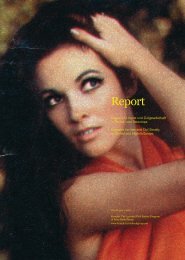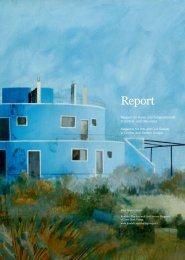Report_Issue 1/2009 - Jubiläum/ 20 Jahre Mauerfall
Report_Issue 1/2009 - Jubiläum/ 20 Jahre Mauerfall
Report_Issue 1/2009 - Jubiläum/ 20 Jahre Mauerfall
Sie wollen auch ein ePaper? Erhöhen Sie die Reichweite Ihrer Titel.
YUMPU macht aus Druck-PDFs automatisch weboptimierte ePaper, die Google liebt.
READING HISTORIES<br />
AND TELLING STORIES<br />
At 6 p.m. on 2 May 1992, the photographer Milomir<br />
Kovačević took a photograph of a couple fleeing<br />
from the outbreak of war on Sarajevo’s main<br />
street, Maršala Tita. This photograph went around<br />
the world and was shown on the front pages of many<br />
international newspapers. For Miroslav Prstojević<br />
and his wife, who can be seen on the photo fleeing<br />
from the grenades, the collapsing facades, dodging<br />
between injured persons, pools of blood and<br />
wrecks, this is not a snapshot for the family album<br />
that one looks at fondly. And yet Prstojević used<br />
it himself again in his book “Sarajewo. Die verwundete<br />
Stadt” (Sarajevo. The Wounded City), as<br />
a part of a history that documents the fate of a city<br />
and its inhabitants. Change of scene. We are sitting in the rear of his bookshop Mi on Burggasse in<br />
Vienna’s seventh district, drinking schnapps and coffee. Since 1995 Miroslav Prstojević has been<br />
selling books written in Croatian, Serb, Bosnian, Slovene and, of course, German. A treasure trove<br />
that, as he proudly explains, is “unique in Europe”. Between cookery books, children’s books and<br />
romance novels there are also hardly known literary treasures that tell the history of the Balkans<br />
in different ways. Novels, histories of cities, documentations of pop culture in the countries of<br />
former Yugoslavia. Particularly amusing is the “Lexicon of YU mythology” a kind of collection of<br />
everyday myths from Yugoslavia or a kind of fictious travel guide (original title: “SFRJ za ponavljace”),<br />
that declares that the “Socialist Federal Republic of Yugoslavia has ‘failed the test’” and that<br />
became a best-seller. Between the books are catalogues with academic paintings and, within range<br />
of vision, a bust of Tito at the door.<br />
Prstojević smirks behind his big moustache: “I’m Yugo-nostalgic. Why not? That was the best<br />
time of my life.” As the son of an officer who fought in the Second World War, while still a child<br />
Prstojević travelled and moved house a lot. Every two to three years his father was stationed somewhere<br />
new. This meant for Prstojević a regular change of schools and languages within Yugoslavia.<br />
It was only when he began to study law that he moved to Sarajevo. Today, he again travels a great<br />
deal to search for new books, to buy and to order. Books in all languages, also in Cyrillic script.<br />
“Almost 300,000 former Yugoslavs live here in Vienna,” the book dealer asserts. And to the question<br />
why, given the large stock of potential customers, his shop has remained so small, Prstojević<br />
answers: “Most of them flee from their own language and want their children to read only books in<br />
German.” Almost nobody can read Cyrillic script any more. For Prstojević this is a misunderstanding<br />
of integration, for “diversity of language ought to be cultivated and also one’s native language,<br />
no matter what country one lives in!” People from all over Europe order books from him through<br />
the Internet. “Our people are scattered throughout the world. From Alaska to New Zealand, I can<br />
always find a ‘hotel bed’ with friends or relatives.” He is certainly never short of a literary gift for<br />
his hosts. More schnapps is poured into the small, stylish glasses. A sip of the Balkans and you<br />
sink somewhat deeper into the sofa, into the past. However: “I only talk about the war with friends<br />
who experienced it,” Prstojević states clearly. He doesn’t have to, he already has.<br />
While still a student, Prstojević wrote his first novellas and worked as a journalist. After this, from<br />
1982 to the outbreak of the war in 1992, he was an editor in the publishing house “Oslobodenje”.<br />
In 1992 his first book, “Forgotten Sarajevo”, was published that, after twenty months of war, indirectly<br />
made it possible for him to escape from Sarajevo. Austrian helpers, who were interested<br />
“Each of us can tell so many fateful stories<br />
that the only thing that makes sense<br />
is to tell and to continue telling”<br />
(Željko Ivanković, Serbian writer 1968–1995)<br />
— Manuela Hötzl —<br />
“Most of them flee from their own language<br />
and want their children to read only<br />
books in German.” Almost nobody can read<br />
Cyrillic script any more. Prstojević this is a<br />
misunderstanding of integration, for “diversity<br />
of language ought to be cultivated<br />
and also one’s native language, no matter<br />
what country one lives in!”<br />
in the book, got him on board one of the few<br />
planes leaving the city. But he did not remain<br />
idle during the period of the war.<br />
In 1993 his guide to the war and the city, “Survival<br />
Guide – Sarajevo” was released in English.<br />
The idea of this ironical guide occurred to<br />
him because at the time he began to grow very<br />
irritated with journalists who flew to Sarajevo<br />
from all over the world in order to subsequently<br />
present their “experience of the war”. So, in<br />
this survival lexicon under “D” for “Drinking”<br />
there are not the usual tips about cocktail bars<br />
or beer pubs, but the following: “The water of<br />
Sarajevo was always famed. Today it is boiled<br />
and cleansed by using tablets. We have a white one for two litres and a green one for five litres. The<br />
problems start when you have a green tablet but no pot that is large enough …”<br />
At the end of 1993 his last book about his personal experiences during his twenty months in wartorn<br />
Sarajevo was published. Entries in his diary are placed next to official reports of newspapers<br />
and magazines from 1992 to 1993. And therefore Prstojević does not have to talk about this war<br />
anymore; he has ‘got it off his chest’ by writing about it as a kind of therapy, so to speak. As an artist<br />
and member of the Austrian PEN-Club, Miroslav Prstojević is allowed to have two passports,<br />
a Bosnian one and an Austrian one. He did not have to decide between the two. He does not want<br />
to go back – he travels a great deal anyway and he stays in contact with his friends mostly by email.<br />
But his younger daughter, who attended the Sozialakademie in Vienna, wants to help in her<br />
former homeland and often travels to Bosnia.<br />
While we drink our fourth schnapps and chat about our families, a friend of his son (born in 1972)<br />
comes into the bookshop. He proudly shows us his residency permit. His is a typical European<br />
biography. He is newly married to an Austrian-Iranian. They met in Rotterdam where he moved<br />
after his childhood in Sarajevo and eleven years in Jerusalem. He has come to buy a greeting card.<br />
He and his friends are flying to London tomorrow, to a Bosnian-English wedding. Prstojević recommends<br />
two books, pours another schnapps “for the road” and just says: “The next time we’ll<br />
talk about my children’s generation that is scattered throughout the world.”<br />
The journalist and author Miroslav Prstojević (born in 1946) is a native Bosnian and now an Austrian citizen. Since 1995<br />
he has been running the bookshop “Mi” in Vienna that specialises in “Yugoslav” literature. Pristojević gained international<br />
acclaim with his book “Sarajevo”. Die verwundete Stadt”, DAG Grafika, Lubljana 1993; Ideja, Sarajevo 1994.<br />
Published in “<strong>Report</strong>” 2/<strong>20</strong>06<br />
61




